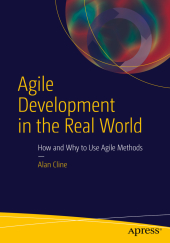 Neuerscheinungen 2016Stand: 2020-02-01 |
Schnellsuche
ISBN/Stichwort/Autor
|
Herderstraße 10
10625 Berlin
Tel.: 030 315 714 16
Fax 030 315 714 14
info@buchspektrum.de |

Alan Cline
Agile Development in the Real World
1st ed. 2016. xxviii, 297 S. 56 SW-Abb. 254 mm
Verlag/Jahr: SPRINGER, BERLIN; APRESS 2016
ISBN: 1-484-21678-4 (1484216784)
Neue ISBN: 978-1-484-21678-1 (9781484216781)
Preis und Lieferzeit: Bitte klicken
This book is a practical guide for new agile practitioners and contains
everything a new project manager needs to know to get up to speed with
agile practices quickly and sort out the hype and dogma of pseudo-agile
practices.The author lays out the general guidelines for running an
agile project with the assumption that the project team may be working
in a traditional environment (using the waterfall model, or something
similar).
Agile Development in the Real World conveys valuable insights to multiple audiences:
For
new-to-agile project managers, this book provides a distinctive
approach that Alan Cline has used with great success, while showing the
decision points and perspectives as the agile project moves forward from
one step to the next. This allows new agile project managers or agile
coaches to choose between the benefits of agile and the benefits of
other methods.
For the agile technical team member, this book contains
templates and sample project artifacts to assist in learning agile
techniques and to be used as exemplars for the new practitioner´s own
project.
For the Project Management Office (PMO), the first
three chapters focus on portfolio management. They explain, for the
agilists´ benefit, how projects are selected and approved, and why
projects have an inherent "shelf-life" that results in hard deadlines
that may seem arbitrary to traditional technical teams.
What You Will Learn:
How and why the evolution of project management, from PM-1 (prescriptive) to PM-2 (adaptive) affects modern 21st century project management.
How sociology (stakeholder management), psychology (team dynamics), and anthropology (organizational culture) affect the way software is developed today, and why it is far more effective
A clear delineation of what must to be accomplished by all the roles (PM, BA, APM, Developer, and Tester), why those roles are needed, and what they must do
Step-by-step guide for a successful project based on studies and the author´s own experiences.
Specific techniques for each role on the development team, both in the pre-iteration and iteration cycles, of product development. The appendices contain templates that the team could use or modify to tailor their own agile processes specific to the team, project, and organization.
Chapter 1. Evolution of Project Management.- Chapter 2. Birth of a Project: Portfolio Management.- Chapter 3. Project Startup.- Chapter 4. Iteration Zero: Preparing the Project.- Chapter 5. Architecture: Product Foundation.- Chapter 6. Infrastructure: Supporting the Project.- Chapter 7. Initial Requirements: Defining the Product.- Chapter 8. Overview of an Agile Iteration.- Chapter 9. Requirements: The Agile Business Analyst.- Chapter 10. Development Thread.- Chapter 11. Testing Thread Outline.- Chapter 12. Project Management Thread Outline.-
Alan Cline is a certified professional in agile practices (ACP) and project management (PMP). He is a recognized leader in both the private and public sectors, with 30+ years experience in leadingorganizations to success; focused on delivering value and customer satisfaction. Known forapplying cutting-edge practices in both traditional and agile styles, and industry-wide concepts,theory and experience, Al has led teams and mentored leaders to deliver quick results forshort-term objectives while building toward strategic goals.


